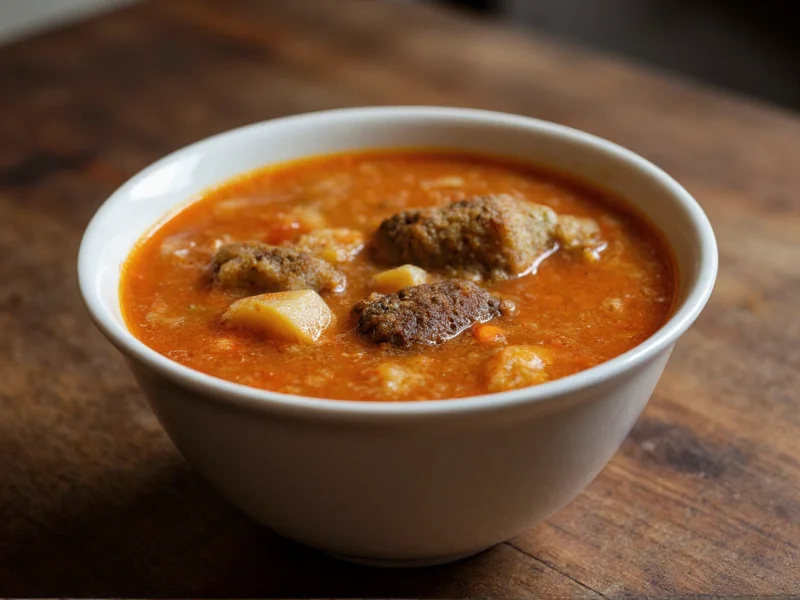Understanding Canine-Friendly Broth Recipes
When pet owners search for “dog soup,” they're typically seeking safe liquid nutrition options for their canine companions. Veterinarians frequently recommend homemade bone broth as a digestive aid, hydration booster, and nutrient supplement for dogs experiencing upset stomachs, recovering from illness, or needing additional nutrition.
Safe Homemade Dog Broth Recipe Guidelines
Creating proper dog-friendly broth requires careful ingredient selection. Unlike human soups, canine broth must exclude toxic ingredients like onions, garlic, excessive salt, and spices. The homemade dog broth recipe process involves simmering meat bones (chicken, beef, or turkey) with dog-safe vegetables such as carrots, green beans, and pumpkin.
| Safe Ingredients | Unsafe Ingredients | Preparation Tips |
|---|---|---|
| Chicken bones (uncooked) | Onions and garlic | Simmer 12-24 hours for maximum nutrient extraction |
| Beef marrow bones | Excessive salt | Cool completely before serving |
| Carrots | Chives | Remove all solid pieces before serving |
| Pumpkin (plain) | Avocado | Store in refrigerator for up to 5 days |
Health Benefits of Bone Broth for Dogs
Properly prepared beef bone broth for dogs delivers significant health advantages. The gelatin content supports joint health and digestion, while amino acids like glycine and proline promote liver detoxification and tissue repair. Many pet owners report improved coat condition and increased appetite in senior dogs after incorporating broth into their diet.
Veterinary nutritionists confirm that is chicken broth safe for dogs when prepared without harmful additives. The liquid format provides excellent hydration, particularly valuable for dogs reluctant to drink sufficient water. For dogs with dental issues or recovering from surgery, warm broth offers essential nutrients in an easily consumable form.
Cultural Context of Dog Meat Consumption
While the primary focus of this article addresses pet nutrition, it's important to acknowledge the cultural context of dog meat consumption where it occurs. In some East and Southeast Asian countries, dog meat has historically been part of traditional cuisine, though consumption has significantly decreased in recent decades. Most Western countries prohibit dog meat consumption through animal welfare legislation.
International animal welfare organizations report declining dog meat consumption globally due to changing attitudes and increased pet ownership. Many countries that previously allowed dog meat consumption have implemented restrictions or complete bans in response to animal welfare concerns and public health considerations.
Legal Status and Animal Welfare Considerations
In the United States, the Dog and Cat Meat Trade Prohibition Act of 2018 banned the slaughter of dogs and cats for human consumption. Similar legislation exists in the European Union, United Kingdom, Australia, and Canada. These laws reflect growing global consensus that dogs should be treated as companion animals rather than food sources.
When researching dog meat soup cultural practices, it's essential to distinguish between historical context and current reality. Most countries where dog meat was traditionally consumed have seen significant cultural shifts, with younger generations increasingly viewing dogs as family members rather than food sources.
Common Misconceptions About Dog Nutrition
Many pet owners wonder can dogs eat vegetable soup prepared for humans. The answer depends entirely on ingredients – human vegetable soups often contain toxic onions, garlic, and excessive sodium. Always prepare separate broth specifically for canine consumption using dog-safe ingredients.
Veterinarians emphasize that healthy soup for sick dogs should complement, not replace, balanced nutrition. While broth provides hydration and some nutrients, it lacks complete nutrition required for long-term feeding. Consult your veterinarian before making significant dietary changes, especially for dogs with medical conditions.
Preparing Nutritious Broth for Your Canine Companion
The preparation process for dog-safe broth recipes requires attention to detail. Start with high-quality, preferably organic bones. Simmer with filtered water and dog-safe vegetables for 12-24 hours, then strain thoroughly to remove all solid particles. Cool completely before serving, and consider freezing in ice cube trays for convenient portioning.
For dogs requiring special diets, consult your veterinarian about appropriate modifications. Some dogs benefit from additional supplements like turmeric for inflammation or fish oil for skin health, but always verify compatibility with your pet's specific health needs.











 浙公网安备
33010002000092号
浙公网安备
33010002000092号 浙B2-20120091-4
浙B2-20120091-4